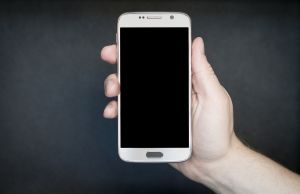
Smartphones are a huge advancement and absolute necessity in today’s world. People carry them around to communicate with others, use the Internet, and a variety of tasks that would be time consuming or impossible without them. However, it comes with a price.
A study conducted by researchers at The University of British Columbia revealed that smartphone distractions have reduced enjoyment of face-to-face interactions. The loss of interpersonal communication is especially true among university students since they grew up with mobile technology.
An experiment was conducted where a group of people in a cafe was given smartphone distractions and another group wasn’t. The results showed a lot of indirect effects such as people who had smartphone distractions felt less connected socially and their perception of time was slower than normal. The results also showed that “phones may have minimal negative effects on individual social interactions; however, these small effects are likely consequential over time.”
Cabrini psychologist Dr. Eliza Costoso claims that research has proven that one reason why people use their cell phones so often is because they see them as “transitional objects.” For example, during childhood, people find attachment with a parent, but when the parent is busy, they look to an object for comfort.
“In childhood, many children may look to a blanket or teddy bear to provide them comfort when the parent is unavailable,” Costoso said. “Cell phones are thought to act in a similar manner. They help to keep us connected to people we love and care about, thereby providing us with an additional sense of comfort.”
In terms of whether smartphones decrease happiness, Costoso feels that it depends on certain factors such as how much time a person spends on their phones as well as how satisfied people are on their phones and their psychological well being. Some research has also shown that when used sparingly, smartphone usage can increase happiness. Costoso has also heard from a few students about how their smartphone usage has affected their relationships with others.
“A cell phone is not a substitute for a human connection,” Costoso said. “It can often be considered a distraction when trying to engage with others, leaving the other party to feel ignored.”
Cabrini sophomore Grace Mallon usually uses her phone for social media such as Snapchat and Instagram but she also uses it for school purposes such as the Blackboard app. She’s especially fond of those social media apps because they combine everything she likes such as photography, writing and interaction into one app.
“Sometimes it helps pass the time and I like finding new interests and becoming more involved,” Mallon said.
Mallon also admitted that she feels a need to be distracted, hence why she spends time on her phone. However, she’s also aware that she can be attached to her phone in a negative way. She feels that if she gave up her phone for about a week, then she would be able to actually enjoy life without having to check her technology constantly.
“I don’t really like having to check everyone’s stuff,” Mallon said.
Mallon is also a fan of face-to-face interaction because it’s more genuine and you can understand others better than you would over the phone. For instance, if someone was joking or being sarcastic with her, she could easily pick up on it if she was talking in person instead of on her phone.
Mallon and her family like to be on their phones a lot, but it can be frustrating for them. For instance, Google Maps has also proven to be misleading for Mallon’s family which has resulted in hostility among them. She also claims that her mother is the most attached to her smartphone since she’s an avid Facebook user. She even tries to figure out family plans over text which has proven to be quite frustrating.
Sophomore digital communications major Emily Miller uses her phone for a lot of tasks such as planning her day, staying in touch with the people she cares about and staying up to date on social media. Her favorite apps include Google Calendar and Instagram. She’s particularly fond of Instagram because she thinks it’s a great place for people to feel artistic with their photos.
Miller likes to spend time on her phone because her responsibilities in everyday life, such as schoolwork and her job, stress her out and her phone can help her connect to people when they aren’t available to talk in person. Despite this, she’s more fond of face-to-face interaction.

“I think your phone helps you plan those face-to-face interactions, but I think that being in it has a lot more emotional meaning,” Miller said.
Over spring break, Miller went on a trip to Guatemala for Dr. Jerry Zurek’s ECG class and while she was there, she chose to refrain from using her phone as much as she usually would. Originally, she thought she wouldn’t be able to and decided to use it to take pictures and stay in contact with her parents. Regardless, Miller had a great time in Guatemala when she wasn’t using her phone because she really wanted to be in the moment during her time there.
“I think it was a mix of not wanting to feel like some kind of American tourist, I was there for more than pictures,” Miller said. “It makes me feel a lot better now knowing that I can look back at it know that I was in that moment and I was in that experience.”
Junior digital communications major and Loquitur Editor-in-Chief Angelina Miller is an avid phone user as well since it allows her to stay updated with school and communicate with friends as well. Like Miller, Ang is also fond of Instagram because it allows ber to branch out to wider audiences, talk to people from around the world and talk about her passion for fitness.
Ang also sees her phone as a form of stress relief since it can distract her from the real world and stress she faces with her school and work-related responsibilities. Despite this, she is also aware that being on her phone for too long can have negative impacts as well such as interacting with friends or walking around.
Ang is also fond of face-to-face interaction but claims that in today’s world, it’s very rare.
“I think that a lot of people meet through a phone or through an interaction through the phone,” Ang said. “For example with Snapchat, a lot of people ask for your Snapchat instead of asking for your phone number primarily, or you start talking with someone through Snapchat instead of in person.”
Ang also went on the trip to Guatemala with Miller and she chose not to use her phone as well.
“I decided to primarily not use my phone so that I would live more in the present moment and really take in all the interactions that I was going through every single day,” Ang said. “Knowing that if I got on my phone or spent too much time on my phone, I would’ve been more consumed in things going on back home or things going on elsewhere instead of actually enjoying the moment that I was in.”
Ang felt that she really got more out of the trip when she wasn’t on her phone because it allowed her to enjoy moments that came out of nowhere.
“You didn’t feel any anxiety or any stress, you just felt joy and happiness and lived in the moment,” Ang said.
It appears that even though smartphones are an incredibly useful tool, using them too much can lead people to feel less connected in reality.
“As an individual, I wouldn’t say that I’m addicted to it but I definitely feel that constantly checking social media gets annoying after a while and I don’t think it would hurt to take a break,” Mallon said.


